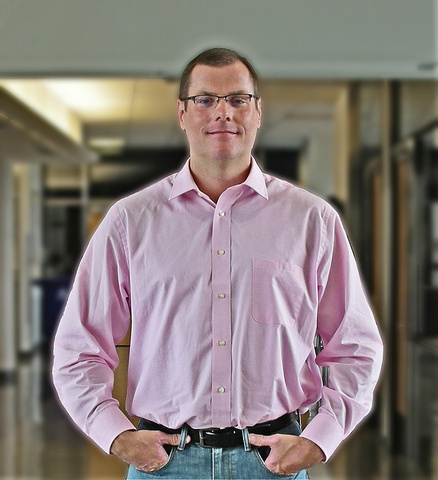 What is your hometown?
What is your hometown?

Carrollton, Illinois.
How/when did you become interested in science and/or medicine?
The science was a natural progression of growing up on a farm, and I like working with animals. The medical research was sort of serendipitous. I didn’t know exactly what I wanted to do once I graduated from college so in the interim I was getting a master’s degree and I was doing a job in research in the industry sector. Now, I feel like in many ways, I’m doing the same thing as my dad does; only I’m doing it with mice. I like the independence of research and that I can make my own path.
When did you join the University of Iowa faculty?
2013.
How or why did you choose to join the faculty at the University of Iowa?
Multiple reasons: I was at UT southwestern in Dallas for six years trying to get back to the Midwest. I did my PhD with Mark Anderson, chair of Internal Medicine at the time I was recruited. That wasn’t the only reason, but it was a bonus. I was hired through the obesity initiative and I do cardiovascular research in obesity models so it was an ideal fit for me to join the obesity initiative here. There is open collaboration and accessibility from the top down, so that sharing of information, data, and resources is freer flowing than other institutions, which makes my research easier because I don’t have to reinvent the wheel for every experiment. The openness here keeps things running smoothly and efficiently.
Is there a teacher or mentor who helped shape your career?
My dad is the one who taught me the value of hard work and independence, and I think that’s the most important lesson. The rest have helped me fill in the details, but I think the values my father instilled were the most important and the basis for my success. I was dual mentored as a PhD student; my mentors are Mark Anderson and Roger Colbran. Between those two I got the best of both worlds. One was very aggressive and progressive and thought on the big-picture level while the other was very detail-education oriented and wanted details on scientific experiment design. The combination of the two was awesome. My post doc mentor, Eric Olson, just had a paper published in Yahoo news; he’s a powerhouse. He is at the top of the field in muscle biology. He taught me how to develop a program vs. developing a project, which is something I try to pass on to my post docs and students. He also taught me that a scientist needs to reinvent himself every 10 years by adapting to new technology and using it in your science.
How do you see your faculty role impacting medicine and/or science?
The biggest thing is my role as an educator and a mentor and it’s the thing that provides me the most joy. I try to teach students to have fun with their science. You have to love coming to work every day, and I try to emphasize that to my trainees and put them in a situation to succeed based on their individual strengths. If you don’t enjoy putting in 60 to 80 hours a week in pursuit of your passion, if that doesn’t excite you, it will be a challenge. I hope to advance our understanding of how cardiac transcription is regulated in response to disease.
What is the biggest change you’ve experienced in your field since you were a student?
The advent of the CRISPR technology is easily the most impactful and I think will win multiple Nobel Prizes.
What one piece of advice would you give to today’s students?
Be able to adapt to technology and use it on something you are passionate about and maintain your plasticity.
In what ways are you engaged in professional activities outside the University?
Spending time going to the Fraternal Order of the Eagles through the Diabetes Center. I have given talks in my hometown. I mentor a lot of undergrads, and I am involved in the local chapter of the American Heart Association.
What are some of your outside interests?
My three kids are my personal interest. I have a 13-, 10-, and 7-year-old who are very active in sports, and I coach basketball and flag football. I was a former college football player so I’m very active in sports.
I lift weights; it’s my therapy. I participate in the “Press Out Domestic Violence” bench press and I look forward to it every year. [Editor’s note: He’s actually won it every year since joining the University.]
I also own a herd of cattle and go back to work with my dad on the farm in Carrollton. I try to get there a couple weeks each year. I hope to someday have my own hobby farm.
Learn more about Chad Grueter, PhD.